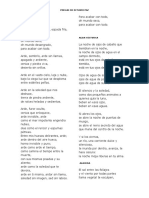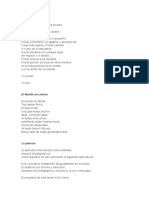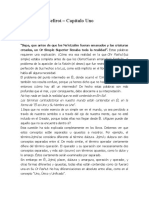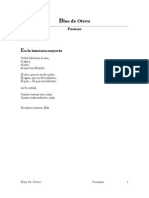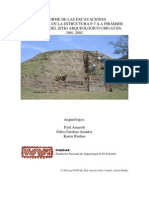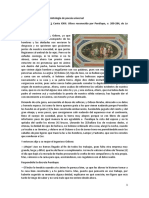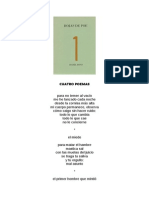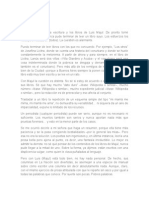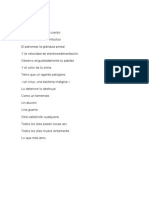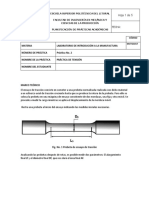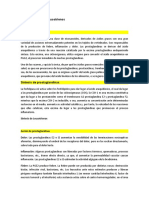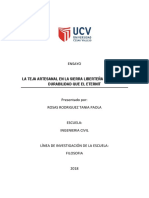Documentos de Académico
Documentos de Profesional
Documentos de Cultura
Dos Poemas de John Keats (Bilingue)
Cargado por
Cristian Maier0 calificaciones0% encontró este documento útil (0 votos)
63 vistas4 páginasEl primer poema critica las supersticiones religiosas y cómo estas mantienen a la gente alejada de la alegría y la conversación intelectual. El segundo poema trata sobre la melancolía y aconseja enfocarse en la belleza natural como las rosas y el arcoíris para aliviar la tristeza, en lugar de recurrir a venenos o criaturas oscuras. El tercer poema describe cómo la melancolía reside junto al placer en el templo del deleite, y sólo puede ser apreciada por aquellos con lenguas capaces de saborear la
Descripción original:
John Keats
Derechos de autor
© © All Rights Reserved
Formatos disponibles
DOCX, PDF, TXT o lea en línea desde Scribd
Compartir este documento
Compartir o incrustar documentos
¿Le pareció útil este documento?
¿Este contenido es inapropiado?
Denunciar este documentoEl primer poema critica las supersticiones religiosas y cómo estas mantienen a la gente alejada de la alegría y la conversación intelectual. El segundo poema trata sobre la melancolía y aconseja enfocarse en la belleza natural como las rosas y el arcoíris para aliviar la tristeza, en lugar de recurrir a venenos o criaturas oscuras. El tercer poema describe cómo la melancolía reside junto al placer en el templo del deleite, y sólo puede ser apreciada por aquellos con lenguas capaces de saborear la
Copyright:
© All Rights Reserved
Formatos disponibles
Descargue como DOCX, PDF, TXT o lea en línea desde Scribd
0 calificaciones0% encontró este documento útil (0 votos)
63 vistas4 páginasDos Poemas de John Keats (Bilingue)
Cargado por
Cristian MaierEl primer poema critica las supersticiones religiosas y cómo estas mantienen a la gente alejada de la alegría y la conversación intelectual. El segundo poema trata sobre la melancolía y aconseja enfocarse en la belleza natural como las rosas y el arcoíris para aliviar la tristeza, en lugar de recurrir a venenos o criaturas oscuras. El tercer poema describe cómo la melancolía reside junto al placer en el templo del deleite, y sólo puede ser apreciada por aquellos con lenguas capaces de saborear la
Copyright:
© All Rights Reserved
Formatos disponibles
Descargue como DOCX, PDF, TXT o lea en línea desde Scribd
Está en la página 1de 4
Dos poemas de John Keats
ESCRITO COMO REPULSA DE LAS SUPERSTICIONES VULGARES
Las campanas repican melanclicamente
convocando a los fieles a nuevas oraciones,
a nuevas lobregueces, a espantosas angustias,
a escuchar el horrible sonido del sermn.
Sin duda que la mente del hombre est encerrada
en un oscuro hechizo, pues todos se separan
del gozo junto al fuego, de los aires de Lidia,
del elevado dilogo con los que en gloria reinan.
An, an repican, y sentira un fro
y una humedad de tumba si no fuera consciente
de que estn extinguindose cual vela consumida,
de que son los gemidos que exhalan al perderse
en el olvido, y pronto crecern nuevas flores
y muchas maravillas de perdurable estampa.
ODA SOBRE LA MELANCOLA
I
No, no, no te dirijas al Leteo ni exprimas
el arraigado acnito de jugo venenoso;
no dejes que en la frente macilenta te bese
la belladona, uva roja de Proserpina;
no te hagas un rosario con las bayas del tejo,
ni conviertas tu lgubre Psique en escarabajo
o en ttrica falena, y que no te acompae
la suave lechuza en tu culto al pesar,
pues, sombra sobre sombra, caern con su letargo,
sofocando la insomne zozobra de tu alma.
II
Mas cuando el arrebato melanclico caiga
del cielo, de repente, como nube llorosa
que alimenta a las flores decadas y oculta
la colina florida con sudario de Abril,
sacia entonces tu pena con rosas matutinas,
o con el arcoris de una ola en la arena,
o con la exuberancia de redondas peonas;
o si tu amada muestra un enfado ostentoso,
aprisiona su mano y deja que delire,
y alimntate a fondo de sus ojos sin par.
III
Con la Belleza vive, que es mortal, con la Dicha,
que est constantemente con la mano en los labios
despidindose, y cerca del Placer doloroso,
que se torna en veneno cuando liba la abeja.
Ah!, y en el mismo templo del Goce la velada
Melancola tiene su santuario supremo,
que slo ve el que estalla las uvas de la Dicha
en fino paladar con lengua vigorosa:
saborear su alma esa fuerza afligida,
y pender entre aquellos trofeos nebulosos.
(Versiones de Alejandro Valero)
Fuente:Odas y sonetos. Ed. Hiperion.
WRITTEN IN DISGUST OF VULGAR SUPERSTITION
The church bells toll a melancholy round,
Calling the people to some other prayers,
Some other gloominess, more dreadful cares,
More harkening to the sermon's horrid sound.
Surely the mind of man is closely bound
In some black spell; seeing that each one tears
Himself from fireside joys, and Lydian airs,
And converse high of those with glory crown'd
Still, still they too, and I should feel a damp, A chill as from a tomb, did I not know
That they are dying like an outburnt lamp;
That 'tis their sighing, wailing ere they go
Into oblivion; - that fresh flowers will grow,
And many glories of immortal stamp.
ODE ON MELANCHOLY
I
No, no, go not to Lethe, neither twist
Wolf's-bane, tight-rooted, for its poisonous wine;
Nor suffer thy pale forehead to be kiss'd
By nightshade, ruby grape of Proserpine;
Make not your rosary of yew-berries,
Nor let the beetle, nor the death-moth be
Your mournful Psyche, nor the downy owl
A partner in your sorrow's mysteries;
For shade to shade will come too drowsily,
And drown the wakeful anguish of the soul.
II
But when the melancholy fit shall fall
Sudden from heaven like a weeping cloud,
That fosters the droop-headed flowers all,
And hides the green hill in an April shroud;
Then glut thy sorrow on a morning rose,
Or on the rainbow of the salt sand-wave,
Or on the wealth of globed peonies;
Or if thy mistress some rich anger shows,
Emprison her soft hand, and let her rave,
And feed deep, deep upon her peerless eyes.
III
She dwells with BeautyBeauty that must die;
And Joy, whose hand is ever at his lips
Bidding adieu; and aching Pleasure nigh,
Turning to poison while the bee-mouth sips:
Ay, in the very temple of Delight
Veil'd Melancholy has her sovran shrine,
Though seen of none save him whose strenuous tongue
Can burst Joy's grape against his palate fine;
His soul shalt taste the sadness of her might,
And be among her cloudy trophies hung.
También podría gustarte
- Fruta Verde - Enrique SernaDocumento255 páginasFruta Verde - Enrique SernaEditorial Azalea94% (16)
- Tratamientos Reafirmantes RoosveltDocumento30 páginasTratamientos Reafirmantes RoosveltJordy Mark Porras Chanca100% (1)
- Plan de EntrenamienoDocumento16 páginasPlan de EntrenamienoValen TabaresAún no hay calificaciones
- John G Lake (LGDD Cap 6)Documento31 páginasJohn G Lake (LGDD Cap 6)Ed Totó GonzálezAún no hay calificaciones
- Poesía para gente sencilla: Poesía para todos los públicosDe EverandPoesía para gente sencilla: Poesía para todos los públicosCalificación: 5 de 5 estrellas5/5 (1)
- Disfemia o TartamudezDocumento8 páginasDisfemia o TartamudezGabo Robles BscAún no hay calificaciones
- Luis Cernuda La Realidad y El Deseo Poesia Casi CompletaDocumento193 páginasLuis Cernuda La Realidad y El Deseo Poesia Casi CompletaMaría Beatriz DuránAún no hay calificaciones
- ContornoDocumento330 páginasContornoCristian MaierAún no hay calificaciones
- Para Caminar Errante (Poesía Quechua)Documento26 páginasPara Caminar Errante (Poesía Quechua)Marco MizziAún no hay calificaciones
- Anacreonte Antología PoéticaDocumento12 páginasAnacreonte Antología PoéticaIgnasi Vidiella PuñetAún no hay calificaciones
- Vogue Latinoamérica - Junio 2021Documento133 páginasVogue Latinoamérica - Junio 2021Alicia Margarita Sánchez Mejorado100% (5)
- Poesía y Poética, 18 (Revista Completa)Documento100 páginasPoesía y Poética, 18 (Revista Completa)Caimito de GuayabalAún no hay calificaciones
- Blake Proverbios Del Infierno y Algunas Rosas EnfermasDocumento11 páginasBlake Proverbios Del Infierno y Algunas Rosas EnfermasjlmansillaAún no hay calificaciones
- Tres Poemas de Shuntaro TanikawaDocumento2 páginasTres Poemas de Shuntaro TanikawaCristian MaierAún no hay calificaciones
- Poemas de Octavio PazDocumento7 páginasPoemas de Octavio PazAna Morales OlivaAún no hay calificaciones
- BOTA Puerta Abierta El HermitañoDocumento102 páginasBOTA Puerta Abierta El HermitañoFelipe Torres Duperly100% (1)
- La Poesia Chilena Moderna 1888 1931Documento355 páginasLa Poesia Chilena Moderna 1888 1931Duda DesrosiersAún no hay calificaciones
- Plan de Responsabilidad SocialDocumento13 páginasPlan de Responsabilidad SocialRichard DiazAún no hay calificaciones
- John Keats - Odas y SonetosDocumento99 páginasJohn Keats - Odas y SonetosJorge O.0% (1)
- Poemas de Jim Morrison DDDocumento7 páginasPoemas de Jim Morrison DDDiego Rodríguez SazaAún no hay calificaciones
- ANANDA K. COOMARASWAMY - Patron y ArtistaDocumento29 páginasANANDA K. COOMARASWAMY - Patron y ArtistaParadigma Complejo100% (1)
- Poetas Líricos InglesesDocumento31 páginasPoetas Líricos InglesesRoxy GonzálezAún no hay calificaciones
- Te Atreves A Quedarte FueraDocumento1 páginaTe Atreves A Quedarte FueraLuis Navarro GallegoAún no hay calificaciones
- Principio Poetico PCDocumento16 páginasPrincipio Poetico PCihersanAún no hay calificaciones
- Canción, Poesía e Interpretación. Eduard Mörike.Documento3 páginasCanción, Poesía e Interpretación. Eduard Mörike.Maria100% (1)
- John Keats. OdasDocumento19 páginasJohn Keats. OdasIogaHom Alzira IyengarAún no hay calificaciones
- Sonetos A ÓrfeoDocumento17 páginasSonetos A ÓrfeoLicenciado Roberto Nativitas100% (1)
- Talmud Eser SefirotDocumento26 páginasTalmud Eser SefirotAriel ParraAún no hay calificaciones
- Los Ultimos Versos de Leonard CohenDocumento14 páginasLos Ultimos Versos de Leonard CoheneithanAún no hay calificaciones
- JOHN KEATS - Oda A Una Urna GriegaDocumento5 páginasJOHN KEATS - Oda A Una Urna GriegaVictorAún no hay calificaciones
- Museo de CeraDocumento718 páginasMuseo de CeraElena HernadezAún no hay calificaciones
- Blas de Otero LIBRODocumento20 páginasBlas de Otero LIBROReitx AreatzaAún no hay calificaciones
- CihuatanDocumento58 páginasCihuatanJilguerogrupoAún no hay calificaciones
- Antologia de Poesia Universal 1 1Documento62 páginasAntologia de Poesia Universal 1 1Alba Albuixech VallesAún no hay calificaciones
- Rabindranath Tagore - Poemas de KabirDocumento35 páginasRabindranath Tagore - Poemas de Kabirhayy_sidi_said4932Aún no hay calificaciones
- El ErmitañoDocumento1 páginaEl ErmitañoMauricioSantelicesArmijoAún no hay calificaciones
- El Proceso de Teshuva - La RestituciónDocumento5 páginasEl Proceso de Teshuva - La RestituciónCristian GaldamesAún no hay calificaciones
- Marzal, Carlos - PoemasDocumento30 páginasMarzal, Carlos - PoemasAnonymous gtmoMUWBy5Aún no hay calificaciones
- RUM Poemas Jose Carlos BecerraDocumento2 páginasRUM Poemas Jose Carlos BecerraPro RamaAún no hay calificaciones
- HÖLDERLINDocumento4 páginasHÖLDERLINFederico GraziadeiAún no hay calificaciones
- Poemas SUFIS RumiDocumento6 páginasPoemas SUFIS RumiSAYFUDDINSGAún no hay calificaciones
- La Topoetica de Octavio PazDocumento8 páginasLa Topoetica de Octavio PazanahialejandrareAún no hay calificaciones
- Isabel Bono. Cuatro PoemasDocumento2 páginasIsabel Bono. Cuatro Poemasmark7447Aún no hay calificaciones
- Herrero Soto - La Arenga de Tariq Ibn ZiyadDocumento30 páginasHerrero Soto - La Arenga de Tariq Ibn ZiyadJean-Pierre MolénatAún no hay calificaciones
- Favero - Nosotros Ellos y Un GritoDocumento63 páginasFavero - Nosotros Ellos y Un Gritoignoto1810Aún no hay calificaciones
- La Habitacion Del PoetaDocumento12 páginasLa Habitacion Del Poetageneracion actual100% (1)
- Waltharius: Rubén FlorioDocumento62 páginasWaltharius: Rubén FlorioMiranda BorsettiAún no hay calificaciones
- El Clerigo MalvadoDocumento8 páginasEl Clerigo MalvadoAaron NomadaOzAún no hay calificaciones
- Henry Kuttner - Mutante PDFDocumento146 páginasHenry Kuttner - Mutante PDFDario FriasAún no hay calificaciones
- El AlmaDocumento3 páginasEl AlmaAnonymous XPhyqOIidAún no hay calificaciones
- Presagios 1957Documento85 páginasPresagios 1957José Carlos BlázquezAún no hay calificaciones
- Un Pajaro Persa Llamado RumiDocumento3 páginasUn Pajaro Persa Llamado RumiWayraAún no hay calificaciones
- Sucre Guillermo, Logos Imaginacion Lezama PDFDocumento16 páginasSucre Guillermo, Logos Imaginacion Lezama PDFSesiónEstudioAún no hay calificaciones
- El Principe VogelfreiDocumento47 páginasEl Principe VogelfreiJuanFraimanAún no hay calificaciones
- Panero, Leopoldo María - Escribir Como EscupirDocumento57 páginasPanero, Leopoldo María - Escribir Como EscupirJack Croce-LiraAún no hay calificaciones
- Yves Bonnefoy, El Camino de La Nieve y La PalabraDocumento11 páginasYves Bonnefoy, El Camino de La Nieve y La PalabrajohnjairAún no hay calificaciones
- María Florencia Rua - Luces Mal UsadasDocumento56 páginasMaría Florencia Rua - Luces Mal UsadasCarlos CrisóstomoAún no hay calificaciones
- La Naturaleza de La Cons CienciaDocumento36 páginasLa Naturaleza de La Cons CienciaFrancisco Martínez MárquezAún no hay calificaciones
- Entregas de La Licorne 1 2 PDFDocumento102 páginasEntregas de La Licorne 1 2 PDFDaniel AttalaAún no hay calificaciones
- Ciudad Del Hombre Jose María FonollosaDocumento9 páginasCiudad Del Hombre Jose María FonollosaChristopher Best100% (1)
- Rubaiyat PDFDocumento26 páginasRubaiyat PDFRodrigo YañezAún no hay calificaciones
- Deseo Del HaikuDocumento98 páginasDeseo Del Haikuredess6Aún no hay calificaciones
- Los Libros de MajulDocumento1 páginaLos Libros de MajulCristian MaierAún no hay calificaciones
- El Espigón Más LargoDocumento8 páginasEl Espigón Más LargoCristian MaierAún no hay calificaciones
- ParanoiaDocumento1 páginaParanoiaCristian MaierAún no hay calificaciones
- Adrian Alvarez Ripalta - Arturo Frondizi, La Doble Via Del PDocumento54 páginasAdrian Alvarez Ripalta - Arturo Frondizi, La Doble Via Del Papi-3846088Aún no hay calificaciones
- Cambiasso Norberto - Los Dias FelicesDocumento19 páginasCambiasso Norberto - Los Dias FelicesCristian MaierAún no hay calificaciones
- El Libro NegroDocumento251 páginasEl Libro NegroGiovanni GuadalupeAún no hay calificaciones
- Práctica de TensiónDocumento5 páginasPráctica de TensiónandreAún no hay calificaciones
- Ficha de Postulante (Autoguardado)Documento9 páginasFicha de Postulante (Autoguardado)Karina Romero SalazarAún no hay calificaciones
- Curso Instalación de Gas - CEDEGASDocumento161 páginasCurso Instalación de Gas - CEDEGASErnesto Durand100% (1)
- Test Estilos Chaea y Vak Evaluación Psp.Documento5 páginasTest Estilos Chaea y Vak Evaluación Psp.PaolaHernandezSepulvedaAún no hay calificaciones
- Luces PilotoDocumento27 páginasLuces PilotoAlex Javier Cajamarca50% (4)
- Flujo Efectivo Tarea 3Documento17 páginasFlujo Efectivo Tarea 3Aneiry GrullonAún no hay calificaciones
- Foro 1.1Documento1 páginaForo 1.1Deichka RodriguezAún no hay calificaciones
- Prostaglandinas y LeucotrienosDocumento3 páginasProstaglandinas y LeucotrienosALONDRA MONTSERRAT GRADILLA SILVAAún no hay calificaciones
- Matriz de ConsistenciaDocumento4 páginasMatriz de ConsistenciaGuber Frank Rodriguez PalianAún no hay calificaciones
- Plan Departamental de Desarrollo Santa Cruz de La SierraDocumento54 páginasPlan Departamental de Desarrollo Santa Cruz de La SierraDiego Farfan BurgosAún no hay calificaciones
- Informe #4 (Fuente de Alimentación D.C.) CALDERON ALVADocumento7 páginasInforme #4 (Fuente de Alimentación D.C.) CALDERON ALVAPedro Calixtro SotoAún no hay calificaciones
- Ensayo Teja Artesanal - FilosofiaDocumento12 páginasEnsayo Teja Artesanal - FilosofiaHugo Castillo RivasplataAún no hay calificaciones
- Spsu-868 Ejercicio U005Documento4 páginasSpsu-868 Ejercicio U005Jhon NiduarAún no hay calificaciones
- Manual Del AnticoaguladoDocumento36 páginasManual Del AnticoaguladoJorge De La Cruz RodriguezAún no hay calificaciones
- PACI 1° BásicoDocumento3 páginasPACI 1° BásicokatherineAún no hay calificaciones
- Tecnologías de Fusión Del HierroDocumento7 páginasTecnologías de Fusión Del HierroomairysAún no hay calificaciones
- Conceptos Sobre ElectromagnetismoDocumento23 páginasConceptos Sobre ElectromagnetismoFernando PaivaAún no hay calificaciones
- Integracion MetabolicaDocumento17 páginasIntegracion Metabolicadaniela fernandezAún no hay calificaciones
- Vigas Pretensadas PDFDocumento48 páginasVigas Pretensadas PDFChristian Veliz LandazuriAún no hay calificaciones
- Actividad 5 - A. Del Sector PúblicoDocumento9 páginasActividad 5 - A. Del Sector PúblicoMaria DOAún no hay calificaciones
- Tarea 2 CeldasDocumento7 páginasTarea 2 CeldasAnthony PFAún no hay calificaciones
- 181T0169 - Cuadro SinopticoDocumento2 páginas181T0169 - Cuadro SinopticoMariajose PérezAún no hay calificaciones
- Que Servicios Nos Prestan Los Bancos y Que Operaciones Podemos Desarollar en EllosDocumento4 páginasQue Servicios Nos Prestan Los Bancos y Que Operaciones Podemos Desarollar en EllosYasSaenzAún no hay calificaciones














